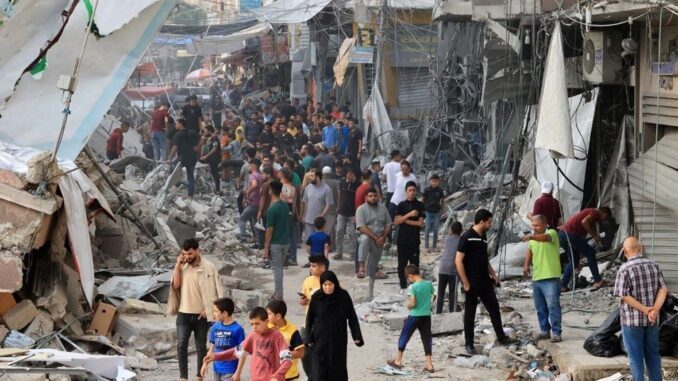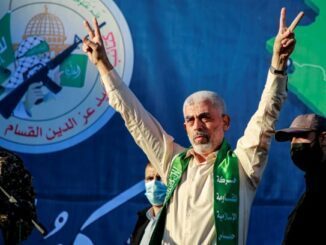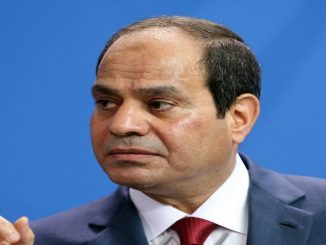
Egypt is coming under intense pressure to allow refugees to cross the border and escape an Israeli bombing campaign and expected ground invasion, reported Wall Street Journal.
“But for Cairo, opening the border —and for whom— is a tough call,” states a report by WSJ.
Egypt plays a unique role with Hamas, mediating its conflicts with Israel while also helping squeeze it with a blockade on goods and travel out of the Gaza Strip, says WSJ.
It has been reluctant to allow the tensions and troubles of Gaza to enter the Sinai Peninsula in its own country in the form of large numbers of refugees, the newspaper adds:
Late Sunday, Egyptian authorities notified border officials to prepare to let U.S. citizens in Gaza through to Egypt in the next few hours, but Egypt’s Abdel Fattah Al-Sisi made clear that a flood of Gazans escaping into Egypt was unacceptable, a situation that could create a refugee crisis within his border that would pose security threats.
A flurry of recent diplomacy, which included a visit to Cairo on Sunday by U.S. Secretary of State Antony Blinken, puts Egypt at the center of efforts to temporarily halt an Israeli bombing campaign that has killed about two thousands, including whole families, displaced a million people – after the October 7 attack launched by Hamas that killed 1,400 Israelis.
However, some Western officials say Egypt hasn’t been helpful and are seeking help from Qatar, which also has ties to Hamas, states WSJ.
The Rafah border crossing, located on the southern end of the Gaza strip and controlled by Egypt, is the only land crossing in Gaza that Israel doesn’t control.
The Israeli military carried out several airstrikes near the crossing last week, bringing a long line of humanitarian aid trucks from Egypt to a halt and forcing crowds to run for cover.
According to a preliminary plan, U.S. citizens would be the first to enter Egypt, followed by American dual nationals and other Western nationalities, then United Nations and other aid workers and finally, employees of international companies.
Egypt initially resisted letting even Americans through on Saturday, asking that the U.S. and Israel first promise a safe passage for humanitarian aid from Egypt into Gaza, according to Egyptian officials. The U.S. estimates that there are between 500 and 600 Americans in Gaza.
“Egypt has put in place a lot of material support for people in Gaza, and Rafah crossing will be reopened,” Blinken told reporters in Cairo, after meeting with Sisi.
“We are putting into place—with the United Nations, with Egypt, with Israel, with others—the mechanism by which to get the assistance in and to get it to the people who need it.”
The pressure to host refugees comes as Egypt’s economy struggles with surging food prices, a depreciating currency and mounting criticism of Sisi, who faces a presidential election in December.
Gulf states, which had resisted providing cash to Egypt, have floated the idea of giving Egypt financial aid in return for accepting Palestinian refugees, according to officials, stated WSJ.
Israel and Qatari delegations have been in Cairo in recent days to try to convince authorities to take in what could be hundreds of thousands of Palestinians fleeing the war.
Sisi has also spoken on the phone with a number of European leaders in recent days, including French President Emmanuel Macron, the British and Dutch prime ministers and Charles Michel, one of the European Union’s top two officials, about allowing passage of EU citizens in Gaza.
European officials have been trying to enlist Egypt’s help to evacuate their citizens from Gaza and to allow humanitarian aid to flow into the enclave.
Egyptian officials have said that for that to happen, Israel needs to halt its attacks temporarily and to ensure the Rafah border crossing is safe to use.
EU officials said that if Egypt does allow in some Palestinians, the bloc’s tripling of humanitarian aid for Palestinians, announced Friday, would go partly to Egypt, noting that additional assistance could be forthcoming.
While Egypt prepares to let some people in, it is fighting back fiercely at the idea of having to host what could become hundreds of thousands of Palestinian refugees, according to officials.
In 1948 after Israel’s founding, tens of thousands of Palestinians flooded into the Egyptian border town of Rafah, turning it into a refugee camp. Tents then became shacks, which became simply constructed buildings to host what became an Egyptian-Palestinian population.
“Egypt has a right to be concerned about Palestinians not being able to return to Gaza,” said H.A. Hellyer, a Middle East regional security specialist at the Royal United Services Institute for Defence and Security Studies.
“It’s extraordinary that Israel, the power responsible for Gaza, is saying Egypt should open up its corridors.”
In a meeting chaired by Sisi before he met with Blinken, the Egyptian National Security Council said it “rejects and condemns the policy of forced displacement and any attempts to liquidate the Palestinian cause at the expense of neighboring countries.”
It reiterated Egypt’s stance that there be a two-state solution, and after the meeting, Sisi called for an international summit to discuss the future of the Palestinian issue.
The other top concern by Egypt is its own national security. In particular, it worries that opening its border will raise the possibility of groups even more extreme than Hamas entering a peninsula that authorities have worked hard to bring under its thumb for about a decade.
After a suicide bomber killed at least 30 Egyptian soldiers at a security checkpoint in 2014, Egyptian authorities delineated an official buffer zone of 79 square kilometers next to the Gaza Strip.
The Egyptian military took over, razing the city of Rafah and, in the following years, pushed out about 100,000 of mostly indigenous Bedouin tribesmen from the area, according to Sinai Foundation for Human Rights, a London-based rights group.
In preparation for an influx of people from Gaza, officials say Egypt has set up additional security cordons for the buffer zone. They have completely closed off Al Arish, a port city roughly one hour’s drive west of Rafah that has become a collection point for humanitarian supplies for Gaza.
Egyptian officials have also discussed capping the number of Palestinians that Egypt would allow to 100,000, so that authorities could manage them in confined areas. Preparations are being made to set up tents in Rafah and the city of Sheikh Zuwayed.
Some analysts warn that a community suffering from blockade by Israel since 2007 and now displacement could be vulnerable to recruitment by extremist groups, introducing unpredictability and complexities for Egypt if it is made to serve as a host. Sisi has stressed to European officials that militants have killed many Egyptian soldiers in recent years.
“If Palestinian factions were able to build up military capabilities in Gaza, then imagine what they could do if they have a much larger border area inside Sinai,” said Mohannad Sabry, a scholar at King’s College London’s Defense Studies Department and author of a book on Sinai.
“They could rebuild and go back to attack Israel again, and Israel would have to fight them on Sinai territory,” Sabry said.
Many in Gaza say they want to stay in their territory, and are worried that Israel’s expected invasion of Gaza is a plan to displace them permanently.
The hundreds of people gathering at the border crossing on Saturday to try to leave were mostly foreign-passport holders, including an estimated 500 and 600 American citizens.
“There’s no sign of an exodus now,” said Sabry, adding that Egypt might not be immediately concerned with an influx of Palestinians as it hasn’t taken steps to physically seal the border completely.
In 2008, tens of thousands of Palestinians poured into Sinai after an explosion at the Rafah border. Prices of food soared, but most of the people returned home to Gaza after one week.
Some Egyptians worry that letting in Palestinians would equate lifting the pressure off Israel, and facilitating a more permanent displacement of their Arab brethren.
“If Gazans were allowed into Egypt, this would mean that there is no more a Palestinian cause and would mean that Egypt contributed to this happening,” said Shady Mohsen, a researcher at the Egyptian Center for Strategic Studies, an independent research institute in Cairo.



